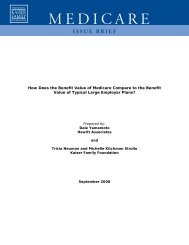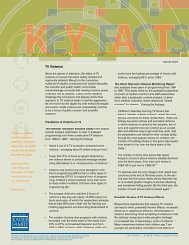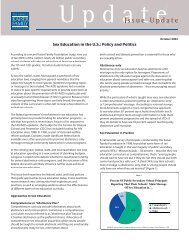HEALTH CARE COSTS: A PRimER - The Henry J. Kaiser Family ...
HEALTH CARE COSTS: A PRimER - The Henry J. Kaiser Family ...
HEALTH CARE COSTS: A PRimER - The Henry J. Kaiser Family ...
Create successful ePaper yourself
Turn your PDF publications into a flip-book with our unique Google optimized e-Paper software.
Medicare responsibilities, is required to develop recommendations to slow the growth<br />
in private national health expenditures while preserving or enhancing quality of care.<br />
<strong>The</strong> ACA creates a private Patient-Centered Outcomes Research Institute to identify<br />
research priorities and conduct and disseminate research on the comparative<br />
effectiveness, risks, and benefits of different treatments and services so that those<br />
providing little or no value can be determined. <strong>The</strong> excise tax on high-cost employersponsored<br />
health plans is designed to encourage employers to make their plans more<br />
efficient and to encourage workers to use fewer services.<br />
CMS estimates that health-spending growth due to the ACA for 2010 (the most recent<br />
data available) is estimated to be 0.2 percentage points, largely due to the provisions<br />
that affected Medicare spending. 42 While estimators have done their best to predict<br />
how the ACA would affect future health spending, both federal and in total, there is<br />
admittedly significant uncertainty around the estimated costs and impact of the new<br />
law. 43 <strong>The</strong> pervasive changes in financing and delivery are unprecedented, and many<br />
of the institutions and reforms have not been proven on a large scale or in diverse<br />
settings. <strong>The</strong>re are questions about the potential effectiveness of the requirement to<br />
purchase coverage, the sufficiency of the premium tax credits and cost-sharing<br />
subsidies, the ability of states to implement the changes effectively, the long-term<br />
impact of the reductions in Medicare payments on hospitals and other providers, as<br />
well as about the potential effectiveness of the delivery system reforms that will take<br />
shape and be implemented over the next several years. In particular, there is hope,<br />
but as of yet only spotty evidence, that changes in health information capabilities and<br />
implementation of new payment approaches that use that information to better align<br />
reimbursement with the achievement of better health can change the trajectory of<br />
future growth in public and private health programs.<br />
Changing the role of government in health care decisions and payments. <strong>The</strong><br />
U.S. health care system is a mix of public and private payment and delivery<br />
arrangements. Compared to many developed countries, public health insurance plays<br />
a relatively small role in covering the population. While the vast majority of the elderly<br />
and many of the poor in the United States are covered through public health insurance<br />
programs, most of the population is covered by private health insurance, albeit with<br />
significant tax financing to help supplement premiums paid by families and their<br />
employers. Private health insurers largely mediate the price and use of services for<br />
people covered by private health insurance.<br />
To more directly control cost growth, the United States could adopt the more direct<br />
interventions that are used in some other countries. For example, the government<br />
(federal or at the state level) could set targets or caps for spending on health care<br />
services; these targets could be set legislatively or the government could facilitate<br />
negotiations between provider organizations and payers. <strong>The</strong> government also could<br />
establish prices for services or even payment approaches that public and private<br />
payers would use. This approach would equalize prices across payers and focus<br />
competition on health management and customer service. On the insurance side, the<br />
government could constrain premium growth, forcing insurers to negotiate more<br />
favorable contracts with their participating providers.<br />
At the other end of the spectrum, the United States could lower health care spending<br />
by reducing the role of government in the health care system. Critics of government<br />
involvement argue that reducing the government role would result in a leaner, more<br />
30 THE HENRY J. KAISER FAMILY FOUNDATION












